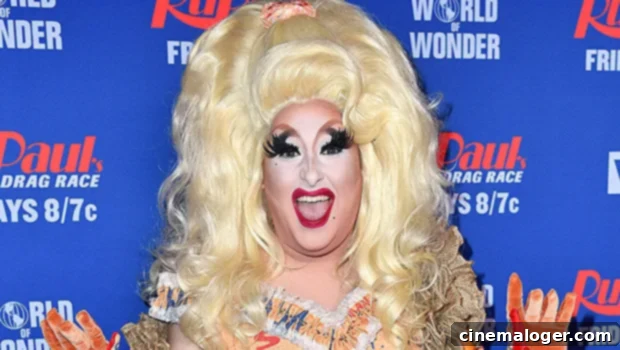Sherry Pie Disqualified from RuPaul’s Drag Race Season 12 Amid Catfishing Allegations: A Deep Dive
The glitz, glamour, and fierce competition of RuPaul’s Drag Race, a cultural phenomenon revered for celebrating individuality and artistry, were momentarily overshadowed by a shocking scandal during its twelfth season. Just hours before her highly anticipated debut, contestant Sherry Pie, whose real name is Joey Gugliemelli, was officially disqualified from the competition. This unprecedented decision followed a flurry of serious allegations detailing her alleged involvement in a series of disturbing catfishing incidents targeting aspiring male actors.
The news sent shockwaves through the drag community and the show’s massive global fanbase. On Friday, March 6, the official RuPaul’s Drag Race Twitter account announced the disqualification, confirming what had been brewing online for days. Multiple men had come forward, sharing harrowing accounts of how Sherry Pie, under the guise of a fictitious casting director named “Alison Mossie” or similar aliases, allegedly manipulated them into sending embarrassing and degrading audition tapes. The allegations painted a picture of calculated deception, exploiting the dreams and vulnerabilities of young performers. While Sherry Pie issued an apology acknowledging the “trauma and pain” she caused, the damage was already profound, leading VH1 and World of Wonder to take swift and decisive action.
The official statement from the RuPaul’s Drag Race Twitter account read: “In light of recent developments and Sherry Pie’s statement, Sherry Pie has been disqualified from RuPaul’s Drag Race.” It further clarified the show’s approach to the season: “Out of respect for the hard work of the other queens, VH1 will air the season as planned. Sherry will not appear in the grand finale scheduled to be filmed later this spring.” This decision underscored the severity of the situation while also attempting to protect the integrity of the competition and the efforts of the other talented queens. It’s important to note that the entirety of Season 12 had been filmed months before these accusations publicly surfaced, presenting a complex challenge for the production team.
Understanding the Catfishing Allegations Against Joey Gugliemelli (Sherry Pie)
The core of the scandal revolves around allegations of catfishing, a deceptive online activity where a person creates a fake identity to pursue a relationship or manipulate someone, often for personal gain. In Sherry Pie’s case, the alleged manipulation transcended typical romantic deception, instead targeting professional aspirations.
A Web of Deceit: Impersonating a Casting Director
At least five aspiring actors bravely stepped forward, detailing how Joey Gugliemelli allegedly used email to catfish them over several years. He reportedly posed as a casting director, often using the fake persona of “Alison Mossie,” enticing these men with promises of roles in high-profile projects. This tactic preyed on the intense desire of emerging artists to break into the competitive entertainment industry, making them susceptible to requests that, in hindsight, were deeply inappropriate and exploitative. The alleged behavior affected individuals from various stages of Gugliemelli’s life, including former classmates at SUNY Cortland and actors with whom he had collaborated at an acting company in Nebraska, suggesting a pattern of behavior spanning multiple years and locations.
Horrifying Audition Tapes: The Exploitative Requests
The alleged methods used by Sherry Pie were particularly insidious. Victims claimed they were coerced into filming humiliating audition tapes, performing degrading acts or saying embarrassing lines under the false belief that these were legitimate requirements for significant acting opportunities. One particularly vivid account came from a Cortland alum, who claimed that in 2015, Gugliemelli convinced him to film scenes in a tank top and shorts for a purported musical version of Tim Burton’s A Nightmare Before Christmas, falsely implying Burton’s involvement. The emotional toll on the victims was significant, as expressed by the alum who told Buzzfeed News: “I just felt really stupid. I felt really dumb.” These accounts highlight not only the deception but also the psychological impact of being exploited in such a vulnerable way, shattering trust and self-esteem.
Sherry Pie’s Apology: A Response to Mounting Pressure
As the allegations gained traction online, Sherry Pie, through her real-life persona Joey Gugliemelli, quickly issued an apology on social media. The statement aimed to address the growing outrage and the severe implications for her career and personal reputation. “This is Joey, I want to start by saying how sorry I am that I caused such trauma and pain and how horribly embarrassed and disgusted I am with myself,” the apology began, acknowledging the deep hurt inflicted upon her victims. She further stated, “I know that the pain and hurt that I have caused will never go away and I know that what I did was wrong and truly cruel.”
The apology also touched upon mental health, a sensitive topic within the LGBTQ+ community and broader society. “Until being on RuPaul’s Drag Race, I never really understood how much my mental health and taking care of things meant. I learned on that show how important ‘loving yourself’ is and I don’t think I have ever loved myself. I have been seeking help and receiving treatment since coming back to NYC.” While a step towards accountability, for many, the apology felt insufficient given the severe nature of the alleged acts and the potential for long-term psychological damage to the victims. She concluded by extending apologies to “everyone I have hurt with my actions,” as well as to her “sisters of season 12 and honestly the whole network and production company,” vowing to “change the behavior and that starts with me and doing that work.”

The Impact and Fan Reaction to Sherry Pie’s Disqualification
The decision to disqualify Sherry Pie was met with widespread agreement across social media platforms, indicating a strong consensus among the fanbase and the broader public that justice had been served. The drag community, known for its fierce loyalty and passionate engagement, united in condemning the alleged actions and supporting the show’s firm stance.
Unanimous Support for the Show’s Decision
The sentiment online was overwhelmingly in favor of RuPaul’s Drag Race‘s swift action. Comments such as “Period y’all did the right thing” and “Face crack of the millennium” flooded social media, reflecting the collective shock and validation felt by fans. The phrase “face crack of the millennium” is a popular drag idiom signifying extreme surprise or disbelief, perfectly encapsulating the dramatic nature of the disqualification. Fans appreciated the show prioritizing the ethical treatment of individuals over potential ratings or storyline continuity, reinforcing the values of respect and integrity that Drag Race often promotes.
Protecting the Show’s Integrity and Other Queens
The production company’s choice to air Season 12 as planned, while excluding Sherry Pie from the finale, was a nuanced approach. It demonstrated a commitment to showcasing the hard work and talent of the other queens who had dedicated immense effort to the competition. The integrity of the show, which has become a significant platform for LGBTQ+ artists, was at stake. By swiftly severing ties with Sherry Pie, the show aimed to distance itself from the alleged reprehensible behavior and uphold its reputation as a safe and empowering space for its contestants and audience.
Precedent: Sherry Pie Isn’t the First Queen to Be Disqualified
While Sherry Pie’s situation was unique in its severity and the nature of the allegations, she was not the first contestant to be disqualified from RuPaul’s Drag Race. This fact provides some historical context, though the circumstances differ significantly.
Willam’s Disqualification: A Different Set of Rules
The most notable prior disqualification occurred during Season 4 with the popular queen, Willam. Willam was famously “DQ’d” from the competition for allegedly breaking some of the show’s stringent rules. While the exact rule infraction was never fully confirmed by production (speculation ranged from having a conjugal visit from her husband to leaking information), it was understood to be a violation of the show’s strict sequestering policies for contestants. This happened mid-season, creating dramatic tension as it unfolded in real-time on television. Willam’s disqualification, while shocking at the time, was primarily about contractual obligations and reality TV production rules. It didn’t involve allegations of criminal behavior or severe ethical breaches against individuals outside the show’s immediate production. This stark contrast underscores the gravity of Sherry Pie’s situation, which dealt with deeply personal and potentially criminal misconduct, moving beyond mere reality show rules into the realm of public morality and victim safety.
Broader Implications for Reality Television and Accountability
The Sherry Pie scandal serves as a stark reminder of the complexities and responsibilities inherent in reality television. While these shows thrive on drama and personality, they also have a moral obligation to their contestants and their audience. The incident has sparked broader discussions about background checks for reality TV participants, the mental health support offered, and the ethical standards expected of public figures, particularly those who gain fame through platforms that champion authenticity and inclusivity.
In the aftermath, the focus rightfully shifted back to the victims and the importance of believing survivors. It also highlighted the power of social media in bringing hidden abuses to light, enabling a collective voice to demand accountability. For RuPaul’s Drag Race, a show built on themes of self-love, acceptance, and overcoming adversity, the disqualification of Sherry Pie was a painful but necessary step to reaffirm its core values and ensure that its platform continues to inspire and uplift rather than inadvertently enable harm.
